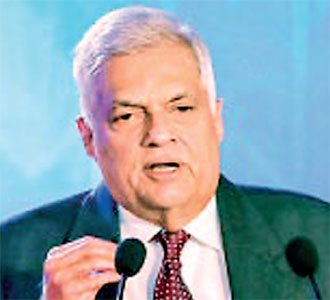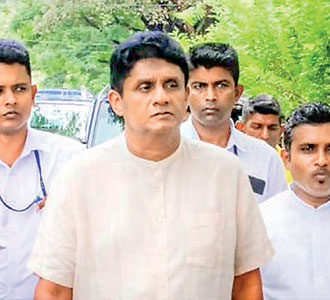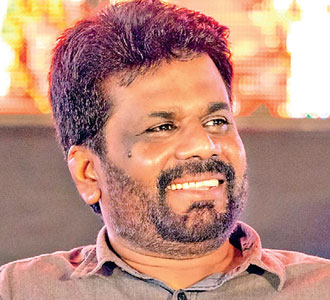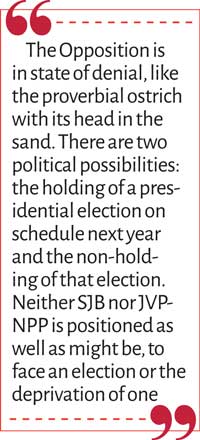Thursday Feb 19, 2026
Thursday Feb 19, 2026
Thursday, 8 June 2023 00:40 - - {{hitsCtrl.values.hits}}

President Ranil Wickremesinghe Nuwara Eliya Doctrine

SJB leader Sajith Premadasa Pulling his punches?

Dr. Harsha de Silva Rightwing Economic Alliance

Anura Kumara Dissanayake Non-Gramscian Left
 “We must all focus on a single goal: reviving the economy and achieving high growth,” said President Wickremesinghe in Nuwara Eliya last week, implying an economic override on electoral democracy, already delayed and deferred, and next year’s Presidential election.
“We must all focus on a single goal: reviving the economy and achieving high growth,” said President Wickremesinghe in Nuwara Eliya last week, implying an economic override on electoral democracy, already delayed and deferred, and next year’s Presidential election.
The President’s Plan B, or probably his Plan A, peeps out in the Politics column of our sister Sunday paper, under the caption ‘Major move to strengthen military and role of CDS’. The three-decker strap has this line: ‘President’s concept paper gets Cabinet nod; Legal Draftsman to work out draft legislation in consultation with AG; Amendment to the CDS Act envisages the establishment of a combined force using industry technology for warfare’.
Warfare is what the President is waging on all fronts. It is a total war and he is on the strategic offensive. By contrast, a confused Opposition is offering sporadic resistance.
Ranil is simultaneously re-modelling the economy (total privatisation, no state sector), society (the Broadcasting Regulatory Act) and the State (hyper-centralist, zero-tolerance autocracy, not people’s sovereignty-sourced democratic republic) with absolutely no mandate, popular consent and therefore legitimacy, to do so.
As a political scientist who favours the comparative global politics method, it looks to me, like the Myanmar model or a ‘civil-military’ variant along old Latin American lines of an ‘autogolpe’, a presidential ‘self-coup’ is on the drawing board.
De-coding Ranil’s discourses
President Ranil Wickremesinghe delivered two important speeches last week. The first was his televised address to the nation on the economy. The second, his speech to the National Law Conference in Nuwara Eliya.
The first speech was scary because of its irrationality and lack of credibility; a speech delivered from Cloud Nine, and redolent of Gotabaya Rajapaksa as candidate and President. Ranil said: “We are working to make Sri Lanka one of the world’s fastest-growing nations.” … “Our goal is to transform Sri Lanka into an export-oriented economy that is globally recognised, following the successful models of countries like South Korea and Singapore…”
He sketched a vision completely at variance with the lived social reality of today, gave no indication of how he is going to arrest present suffering (as distinct from comediennes), when he’s going to do so, and whether he’s going to respect the people’s constitutionally-prescribed chance next year to exercise their choice of someone to do so.
All available figures show poverty increasing in both absolute and relative terms and doing so at an accelerated rate. But Ranil’s administration is cutting back on the numbers entitled to state assistance. So, the poor are increasing but the recipients of social entitlement payments are simultaneously decreasing. Does this sound logical and sustainable, let alone fair and just, to you? Does it seem like normalcy, let alone progress?
 Pillar 2 of the President’s economic strategic plan, ‘Investment drive’, is described by him as follows:
Pillar 2 of the President’s economic strategic plan, ‘Investment drive’, is described by him as follows:
“…Under the Lab approach, we will bring together Government Ministers, government officials, subject matter experts, and key representatives from the private sector to collaboratively engage in detailed discussions over a period of six weeks. The aim is to collaboratively resolve any roadblocks hindering the roll-out of investments and projects by listening carefully to the private sector.”
The ‘Lab’ approach refers to rightwing Venezuelan economist Ricardo Hausmann’s ‘Growth Lab’ at Harvard. As a former (elected) Chairperson of the ILO, what jumps out at me is the absence in this model of the employees as represented by the trade unions. So, private capital will be listened to carefully, but labour will be absent. There will be no dialogue with the working people and no socially consensual solution.
Pillar 4 of the President’s plan is State Owned Enterprises Transformation. It is Ranil’s final solution for the state sector of the economy. He says: “There are currently 430 public enterprises operating in 33 sectors of the economy… many of these enterprises have garnered monopolistic positions in the market, hindering private investment.”
What President Wickremesinghe is concerned about is that there should be no “hindrance” to private investment. There is no role in his model, for state, cooperative and/or joint investment. He is totally uninterested in a pluralism of types of ownership within the economy.
In his Nuwara Eliya speech Ranil says “We need a radical change and must depart from our partially open and partially controlled economy.” A ‘partially open and partially controlled economy’ is a mixed economy and describes most economies on the planet. Can President Wickremesinghe name a country (except North Korea) with an economy that isn’t ‘partially open and partially controlled’?
Ranil’s model is fully ‘open’ and privately-owned. Thus, the absence of the labour unions and a dialogue with them in his ‘Lab’ model. Such economic thinking has been denounced by Nobel Laureates Joseph Stiglitz and Paul Krugman as ‘free market fundamentalism’.
The President’s televised address to the nation gives a significant indicator of a timeline: “…leading to a fully stabilized economy within the next five years.” His Nuwara Eliya speech implies a moratorium on democratic elections until then (at least).
Nuwara Eliya was zanier than his televised address to the nation.
“…However, what concerns me is the lack of political parties with stable political structures. This situation poses a danger. Furthermore…the combined support of all political parties in Sri Lanka does not exceed 50% of the voter base. Considering our highly politicised country, this number could have been as high as 70%, leaving only 10% to decide our fate.” (President urges radical economic transformation at National Law Conference | Daily FT)
That’s really rich. Ranil wrecked the two parties of Sri Lanka’s two-party system which antedated India’s by two decades. He not only crashed the UNP, but also the SLFP which shattered after aligning with him in Yahapalanaya (as will the SLPP).
There is not a shred of evidence to support Ranil’s Nuwara Eliya assertion that “the majority of our people have lost faith in elections and politics”. That conclusion could only have been arrived at had elections been held and there had been low participation, but there’s no data because President Wickremesinghe pulled the plug on the scheduled elections, Pradesheeya Sabha and Provincial Councils.
So, President Wickremesinghe is most worried by his belief that no political party, and probably not even all the political parties put together, can score over 50%.
Firstly, why worry? The Sri Lankan electoral system is such that if no presidential candidate gets over 50% at the presidential election, it goes into a second round of counting in which the preference votes are counted, with the process being repeated until a winner emerges who has topped the 50% mark.
Secondly, it is hilarious hypocrisy that someone who couldn’t even be elected to the legislature and yet governs the country with the narrowest conceivable base of consent and is running scared of even a municipal election, is “worried” that no political party or combination of parties can vault the 50% barrier.
Thirdly, the apprehension runs against available statistics. Dr Ravi Ranan-Eliya’s IHP/SLOTS poll shows Anura Kumara Dissanayake clocking 51% in February 2023, and Anura and Sajith taken together at this moment, accounting for 82% (45% + 37%) popular support, giving the lie quite dramatically to the President’s assertion.
Fourthly, what business is it of unelected President Wickremesinghe’s? Constitutionally he has to hold a Presidential election next year and either contest or not. If he doesn’t want a Presidential election he has to prove a two-thirds majority in parliament and hold a Referendum, which he will either win or lose. (He’ll lose). If he contests the Presidential election, he either wins or loses. If he loses a Referendum, or doesn’t hold one and goes on to delay the presidential election, he will be an unconstitutional President, not merely illegitimate but also illegal – and will face the consequences. As Arnold Schwarzenegger says in FUBAR, “That’s it and that’s all”.
In Nuwara Eliya, Ranil returns to a theme that he articulated early in his term, shortly after selection to office by the votes of the ruling SLPP in Parliament. Namely, that we shall first straighten out the economy by getting out of the debt trap sustainably “and then see what we are going to do next”. “Do next” about what? Going by the Constitution, what we have to “do next”, whether or not the economy straightens out and flies right (as the Nat ‘King’ Cole song went), is to have Presidential elections next year, 2024, 15 months from now.
Harsha makes a hash
The paralysing contradiction at the heart of the SJB is most transparently illustrated by the interview Dr. Harsha de Silva gave the Asian Mirror, posted under the title “There is no Difference Between the President’s Economic Ideology and our Economic Ideology”. (https://fb.watch/kWMB9wwBEk/?
mibextid=RUbZ1f)
 Harsha says he has always been of the view that “we” who share a common ideology, chiefly a common economic ideology, should get together; and that there is no difference between the economic agenda of President Ranil Wickremesinghe and “us”. He says that the economy will be out of the woods by 2026/7 and can then be creditworthy, i.e., go back to the private money markets. He narrows down his differences with President Wickremesinghe to the alliance with the corrupt Rajapaksas and thinks that “we” should unite around a shared economic agenda but seek and obtain a mandate.
Harsha says he has always been of the view that “we” who share a common ideology, chiefly a common economic ideology, should get together; and that there is no difference between the economic agenda of President Ranil Wickremesinghe and “us”. He says that the economy will be out of the woods by 2026/7 and can then be creditworthy, i.e., go back to the private money markets. He narrows down his differences with President Wickremesinghe to the alliance with the corrupt Rajapaksas and thinks that “we” should unite around a shared economic agenda but seek and obtain a mandate.
This means Harsha agrees with Ranil’s extremist vision of an economy that isn’t “partially open and partially closed”, but is fully open and has only private sector ownership.
In 2015, Ranil, Mangala and Harsha stonily ignored the advice tendered in Colombo by Joseph Stiglitz. “One economist who has a strong influence on the Vatican is Nobel Laureate Joseph Stiglitz…” wrote Forbes magazine. (Pope Francis And The Economists (forbes.com) That’s one guy Harsha sure doesn’t share an economic ideology with as he does with Ranil and Ricardo Hausmann.
Harsha never once defines “we” and “us” who “share” Ranil Wickremesinghe’s economic ideology. Does he mean the SJB and its leader Sajith Premadasa—whose name he never once mentions in the long interview?
Harsha’s strident stand sabotages the SJB which is in competition with the JVP-NPP for the anti-government vote. Firstly, if ‘we’ share the economic ideology of Ranil, think he is on the right track, and that things are going reasonably well and we’ll be out of the woods in a few years, there is absolutely no reason to vote for the SJB. ‘We’ may as well vote for Ranil.
If the majority of citizens are in economic pain, and therefore don’t like Ranil’s economic ideology which is shared and endorsed by the SJB’s pre-eminent economist Harsha de Silva, then they could vote for the JVP-NPP and probably will.
One of the most iconic products of the elite Ceylon Civil Service, Neville Jayaweera, concluded 16 years after President Premadasa’s assassination:
“…The soaring vision he [Ranasinghe Premadasa] had for his country, and I do not mean merely for the Sinhala people but for Sri Lanka as a nation, was unmatched by any political leader of the last century, either conceptually, or in terms of the intelligence and managerial energy with which he backed it up …” (http://archives.sundayobserver.lk/2009/01/11/fea15.asp)
With that developmental heritage to build on, Sajith Premadasa should reject Harsha’s banal, Ranil-derivative economics. Meanwhile, can’t someone please arrange for Harsha de Silva and Pubudu Jayagoda to debate economic policy on TV (without the former strenuously objecting to management)?
SJB’s ambivalence and ambiguity
The Opposition is in state of denial, like the proverbial ostrich with its head in the sand. There are two political possibilities: the holding of a presidential election on schedule next year and the non-holding of that election. Neither SJB nor JVP-NPP is positioned as well as might be, to face an election or the deprivation of one.
Sajith is not positioned optimally because he and his party are not on the offensive against Ranil on economic policy—which matters most to the majority of voters. The SJB is sporadically critical of Ranil on political-democracy-human rights issues, but there too, is hardly on a blistering offensive. A stark contrast is R. Premadasa’s verbal flamethrower while in Opposition in 1970-1977, targeting Prime Minister Sirimavo Bandaranaike in and out of Parliament.
Quite simply, in this pre-election year, the SJB and Sajith hardly come-off as anti-incumbent, i.e., anti-Ranil. That’s a basic blunder which will be a large liability if elections are held.
With any election, including next year’s biggie in doubt, the SJB isn’t resorting to nationwide street protests to secure electoral democracy due to ambiguity about frontal agitation against Ranil. Agitation against the Rajapaksas’ SLPP alone is meaningless because the elections are withheld primarily by Ranil.
The SJB’s strategic ambivalence and ambiguity are on display in a report in our sister daily.
‘“We have told the President that a general election should be held first to find out the opinion of the people. We have told him that we will consider supporting him depending on the fresh mandate of the people,” [SJB National Organizer] Tissa Attanayake told a media briefing.
“The President told us to work with him collectively, but the main issue is that he is allied with the wrong people. He is with the SLPP which is responsible for the current economic crisis. This is the main reason which is stopping us from working with the President,” he said.’
This completely misses the point that Ranil Wickremesinghe himself has no “mandate of the people” (even less so than the SLPP). It implies that the SJB is ready to work with the unelected, illegitimate Ranil with his economics of accelerated povertisation, if only he dumps the SLPP through a parliamentary election. Where does this leave the Sajith Premadasa presidential candidacy?
If Sajith doesn’t regard Ranil as young Muhammad Ali (at the time, Cassius Clay) regarded Sonny Liston, then he shouldn’t run. Ranasinghe Premadasa was determined to run for President in 1988 with or without the ruling UNP. When given his party’s nomination, he ran on his own pro-people development platform, not that of JR, still less Lalith or Gamini. Sajith should follow his father’s example.
Anti-Gramscian JVP-NPP
Unlike the SJB, the JVP-NPP is unambiguously adversarial to both Ranil and the Rajapaksas—which gives it a definite advantage. However, Harsha’s ‘unite the (economic) Right’ project may succeed even partially. Therefore, to be an appealing alternative for the SJB’s sizeable populist support-base, the JVP-NPP should openly delete its hatred towards President Premadasa, an organic hero and icon of the subaltern strata.
The JVP-NPP will have to offset a possible Ranil-SJB Right rapprochement by the dynamic countervailing appeal of a united Left, which means an alliance with the FSP and the IUSF. Even the campaign to secure elections starting with the local authorities’ election, would require the FSP-IUSF skills-set to be successful.
The JVP-NPP has set its face squarely against any of these Gramscian strategic moves, though it needs to undertake all of them to create a new chemistry for victory, much more so in the light of the militarisation ‘concept paper’ of President Wickremesinghe.